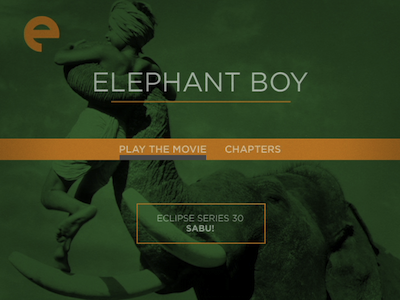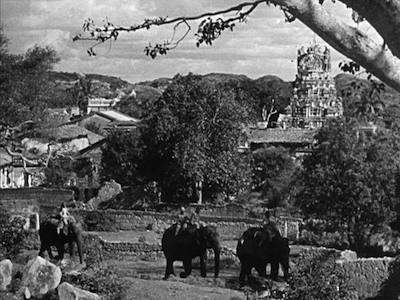
Any mystery of why the Kordas picked a particular twelve-year-old Indian boy to star in their 1937 Rudyard Kipling adaptation Elephant Boy (82 minutes) is cleared up the moment Sabu steps onto screen. The film begins--and indeed, opens the latest Eclipse boxed set from Criterion, modestly titled Sabu!--with the wide-eyed child addressing the audience directly, explaining to one and all the nature of the story they are about to see. He is in character as Toomai, a would-be elephant hunter with a history remarkably similar to Sabu's own, but for as scripted as the words he says may be, they sound like the gospel truth coming out of the boy's mouth.
Indeed, the youngster's personal history is remarkably similar to how Toomai's is depicted in John Collier's screenplay. The son of an elephant driver is orphaned on a hunt, later to be taken under the wing of a rich British colonialist. Though Sabu's personal trajectory would see him starring in several films for Alexander Korda, Toomai's was different. He dreamed of being a hunter, and his particular affinity for elephants leads to him proving himself where otherwise the small fry had been doubted. Toomai and his pet bull, along with his old man (W.E. Holloway), join the hunting party of a wealthy white hunter named Petersen (Walter Hudd, Major Barbara [review], The Importance of Being Earnest). The expedition embarks on a particular dismal season when elephants are scarce and tigers are plenty. Though the rest of the party doubt Toomai's ability, he is the only one who can control his pet, and together they find where its distant relatives have disappeared to, thus saving the day.

Elephant Boy is entertaining, if slight. It gears toward the young, as do most of Sabu's early features. Most boys dream at some point of wilderness life and communing with animals, and so the eager wish fulfillment has a resonance even if the times have changed drastically. Zoltan Korda co-directed the picture with Robert Flaherty, whom film buffs will recognize as the director of Nanook of the North, which is generally considered to be the template for documentary filmmaking. Unsurprisingly, the startling footage of Indian life and particularly the remarkable scenes with the wildlife is mostly Flaherty's doing, giving Elephant Boy a pleasing authenticity that would not have been possible back at Denham Studios. Directing children and animals is supposed to be the hardest thing a director can undertake; in Elephant Boy, both look easy.
This left Zoltan Korda (The Four Feathers [review]) to direct the narrative scenes, bringing a traditional British storytelling veneer to the simplistic plotlines. For the most part, the joint effort is seamless, with only a few instances of a jarring disparity between the two styles (editor Charles Crichton should probably get a special mention here; he began his career as an editor in the 1930s and ended it as a director, helming his last feature, A Fish Called Wanda

Elephant Boy was followed in pretty rapid succession by several more Sabu vehicles with the Kordas, including the magical 1940 classic The Thief of Bagdad [review]. This Michael Powell feature fell between the next two movies in Sabu! - Eclipse Series 30, 1938's Drums and Sabu's other Kipling adaptation and probably his best-known film, The Jungle Book, released in 1942. You can read about those two color adventures here.

This disc was provided by the Criterion Collection for purposes of review.

No comments:
Post a Comment